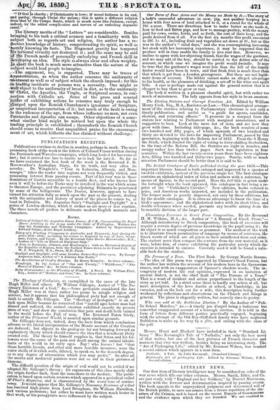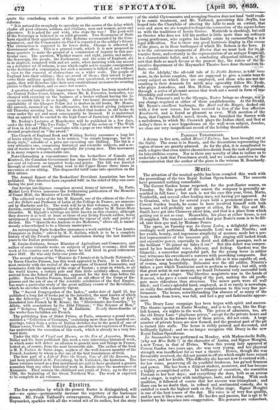LITERARY NEWS.
Our first item of literary intelligence may be considered an echo of the war news which fills our other columns. Messrs. Smith, Elder, and Co. are just ready with "England and her Soldiers," by Harriet Martineau, written with the fervour and determination inspired by passing events. The book appeals to the unprejudiced judgment and determined will of the British public, to save our armies from a future repetition of the -dis- asters of the Crimea, and is based on the recent Reports of Commissions and the evidence upon which they are founded. We are enabled to
quote the concluding words on the procastination of the necessary reforms.
" It is natural for everybody to speculate on the causes of the delay which chafes all good citizens, soldiers, and civilians, men and women, peers and placemen. It is asked far and wide, who stops the way ? The good-will of the Sovereign is believed in on solid grounds. Two Secretaries of State have signified their approbation of the Reforms recommended by the Com- missioners, and the Commander-in-Chief is regarded as the soldier's friend. • The obstruction is supposed to lie lower down. Change is abhorred in Government offices. This is a general truth, which it is now proposed in some quarters to make the ground of a commission of inquiry in this par- ticular case. The question, Whether reason and right, justice and mercy, the Sovereign, the people, the Parliament, and the army of England, are to be slighted, tampered with and set aside, when insisting with one accord on a definitive set of reforms, is one which ought not to require consignment to the decision of a commission, but such a measure is talked of, not without a view to the removal of obstructions on a wider scale. The people of England love their soldiers ; they are proud of them ; they intend to pre- serve their military quality from being ever questioned, or overshadowed again, they will therefore take their own constitutional measures for securing justice to their soldiers, and no more lost armies.
A question of considerable importance to booksellers has been mooted in the Central Police Court, Glasgow, where Mr. R. Forrester, bookseller, was charged with carrying on the business of a broker without having the li- cense to enable him to do so legally. After two hours' discussion as to the appliability of the Glasgow Police Act to dealers in old books, Mr. Monro, the assessor, summed up in the affirmative, but deferred giving judgment till Thursday morning last, when he decided that traders in old books do come under the act and must consequently be licensed. It is understood that an appeal will be carried to the high Court of Justiciary at Edinburgh.
Mr. Ruskin's Lectures at Manchester will be published in a few days, under the title of "The Two Paths." The last of the series on " The Work of Iron in Art and Policy," concludes with a page or two which may now be deemed prophetical on " the sword."
The Church of England Book and Writing Society announce a long list of books which they require to be written "in simple language, but in a lively style," saleable at a price not exceeding one shilling. The list is a very attractive one, comprising historical and scientific subjects, and a se- ries of stories for cottagers, and especially for young men. This movement is in many respects a remarkable one.
Notwithstanding a remonstrance from the booksellers of Canada and Montreal, the Canadian Government has imposed the threatened duty of 10 per cent ad valorem on imported books and prints. The bill was hurried through at railroad speed, being read in the Upper House three times in succession at one sitting. This disgraceful tariff came into operation on the 28th ultimo.
The Annual Report of the Booksellers' Provident Association has been published. The directors have expended 9481. in the relief of fifty-one cases during the past year.
Oar foreign intelligence comprises several items of interest. In Paris, Michel Levy Freres announce the forthcoming publication of the Memoirs of Count Mole, the Minister of Louis Philippe.
The collected works of the late M. Rigault, one of the editors of the Jour- nal des Debats and Professor of Latin at the College de France, are announ- ced by Hachette and Co. The work will be in four volumes, with an intro- duction, containing a biographical sketch of the author by M. Saint-Marc Girardin. M. Rigault's writings are little known in this country, although they deserve it as well at least as those of any living French author, being unsurpassed among modern compositions for vigour of style and purity of diction. His " Querelle des Amiens et des Modernes," above all, is unani- mously acknowledged to be a literary masterpiece.
An enterprising Paris bookseller announces a work entitled " Les Armees Francaises en Italie," edited by M. N. Gallois, which is to be a complete history of all the French expeditions undertaken during the last hundred years to the Italian peninsula.
M. Cunin-Gridaine, former Minister of Agriculture and Commerce, and author of some valuable works on subjects of political economy, died this week at his country seat at Sedan, where he had lived in great retirement since 1848. He was only forty-one years old.
The second volume of the " Histoire de l'Annee et de la Garde Nationale," by Baron Charles Poisson, has this week appeared in Paris. It is filled al- most entirely with the recital of the operations of General Dumouriez, and terminates with the opening of the siege of Toulon; a siege in which, as all the world knows, a certain pale and thin little artillery officer, recently arrived from the School of Brienne, appeared for the first time before the , public. Baron Charles Poisson, himself an old officer of the Corps of En- gineers and the son of one of the scientific celebrities of the first Empire, has made a particular study of the great military events of the Revolution, which he sketches with a masterly vigour.
The " Sacred Congregation of the Index," under date of April 11, has published a long list of books put in the interdict, the most known of which are the following—" L'Amour, " by M. Michelet ; " The Book of Job," .translated into French by M. Ifenan ; the " Dictionnaire des Conciles," by Alletz, with annotations by the Abbe Filsjean; " The Science of Man," and " Religious Physiology," by M. Enfantin. Nearly three-fourths of the works thus forbidden are French.
The publishing firm of Didot Freres, at Paris, announce a grand work, entitled a "Collection of Costumes," containing more than five hundred en- gravings, taken from a series of Italian sketches due to the pencil of one of Titian's sons, Vecelli. M. Gerard Leguin, one of the best engravers of France, has undertaken the execution of this work, which is already in a very for- -ward state.
Under the title of Virgil and Horace, or the Era of Augustus, Messrs. Didier and Co. have published this week a very interesting historical work, in which some will detect an allusion to present men and things in France, looked at, of course, from the most favourable side. The author of the book is M. E. Fariau de Saint-Ange, nephew of the well-known member of the French Academy to whom is due one of the best translations of Ovid. The first part of a Life of Peter the Great, Czar of All the Russia., has just been published at St. Petersburg, by M. Ustrialow, the historian. The three volumes issued as a first instalment are said to have produced a greater sensation than any other historical work in Russia since the masterpiece of (Karamsin. They contain the childhood and youth of Peter, up to the year 1700, the beginning of the Great Northern War. The work is expected 'to be complete in six volumes.



























 Previous page
Previous page